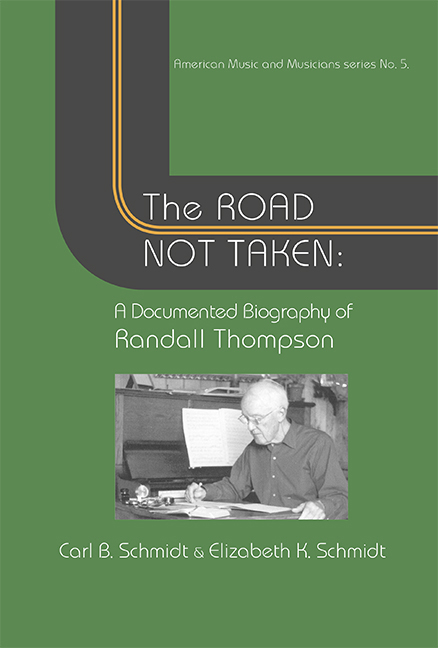Book contents
- Frontmatter
- Contents
- List of Illustrations
- List of Tables
- Library Sigla and Abbreviations
- Guide to Harvard University and Oberlin College Collections Referenced by Box Number
- Preface: Gateway to a Career
- Acknowledgments
- Chapter I Family History and Formative Years
- Chapter II Undergraduate Study at Harvard College (1916-20)
- Chapter III Lessons with Ernest Bloch and Graduate Study at Harvard University (1920-22)
- Chapter IV Damrosch Fellowship Years at the American Academy in Rome (1922-25)
- Chapter V Courtship and Marriage (1925-27)
- Chapter VI New York City—Wellesley College—A Guggenheim Fellowship (1927-31)
- Chapter VII Guest Conducting, Reception of Symphony no. 2, and College Music: An Investigation (1931-35)
- Chapter VIII Life after College Music: An Investigation (1935-37)
- Chapter IX The University of California at Berkeley (1937-39)
- Chapter X Curtis Institute of Music: The Hiring Process (Spring and Summer 1939)
- Chapter XI Curtis Institute (Fall 1939-Spring 1941)
- Chapter XII The University of Virginia (Fall 1941-Spring 1945)
- Chapter XIII Princeton University (Fall 1945-Spring 1948)
- Chapter XIV Return of a Favored Son: Harvard University (Fall 1948-Spring (1957)
- Chapter XV Harvard University (Summer 1957 to July 1, 1965)
- Chapter XVI The Early Retirement Years (1965-75)
- Chapter XVII The Final Years (1975-84)
- Chapter XVIII Recapitulation and Coda
- Bibliography of Works Cited by Abbreviations
- Index
Chapter VII - Guest Conducting, Reception of Symphony no. 2, and College Music: An Investigation (1931-35)
- Frontmatter
- Contents
- List of Illustrations
- List of Tables
- Library Sigla and Abbreviations
- Guide to Harvard University and Oberlin College Collections Referenced by Box Number
- Preface: Gateway to a Career
- Acknowledgments
- Chapter I Family History and Formative Years
- Chapter II Undergraduate Study at Harvard College (1916-20)
- Chapter III Lessons with Ernest Bloch and Graduate Study at Harvard University (1920-22)
- Chapter IV Damrosch Fellowship Years at the American Academy in Rome (1922-25)
- Chapter V Courtship and Marriage (1925-27)
- Chapter VI New York City—Wellesley College—A Guggenheim Fellowship (1927-31)
- Chapter VII Guest Conducting, Reception of Symphony no. 2, and College Music: An Investigation (1931-35)
- Chapter VIII Life after College Music: An Investigation (1935-37)
- Chapter IX The University of California at Berkeley (1937-39)
- Chapter X Curtis Institute of Music: The Hiring Process (Spring and Summer 1939)
- Chapter XI Curtis Institute (Fall 1939-Spring 1941)
- Chapter XII The University of Virginia (Fall 1941-Spring 1945)
- Chapter XIII Princeton University (Fall 1945-Spring 1948)
- Chapter XIV Return of a Favored Son: Harvard University (Fall 1948-Spring (1957)
- Chapter XV Harvard University (Summer 1957 to July 1, 1965)
- Chapter XVI The Early Retirement Years (1965-75)
- Chapter XVII The Final Years (1975-84)
- Chapter XVIII Recapitulation and Coda
- Bibliography of Works Cited by Abbreviations
- Index
Summary
You will find me most earnestly interested in your
future creative artistry and I send you my best
wishes for that and for your personal welfare.
(Bruno Walter)
The period between Thompson's return from his Guggenheim Fellowship and the completion of College Music: An Investigation was pivotal. It moved his career in a significant new direction, that of assessing the role of music in liberal arts colleges and becoming a leader in curricular reform. This was a most important step toward future academic positions. Moreover, these years solidified his credentials as a choral conductor, welcomed the birth of his third and fourth children, and witnessed the exponential expansion of a group of influential friends. Sadly, it also witnessed the decline of his moth¬er's health and ultimately the death of both parents. While the success of his Second Symphony propelled him into the national spotlight as a composer, the necessity to work much of the time in non-academic settings curtailed his compositional output. These years yielded but a single new composition: Americana (RT 52) for chorus and piano. They also yielded a book and ten published articles. Unsure what employment summer and fall 1931 might bring, the family stayed with Margaret's parents in Montclair. As had been the case when returning after his Prix de Rome years, Thompson busied him¬self looking for work, which fortunately was not long in coming.
He wrote a series of articles: two concerned Antheil, and a third reviewed the Juilliard School performance of Jack and the Beanstalk, Louis Gruenberg's opera on John Erskine's libretto. A fourth concerned the second year at Yaddo, a Festival that had begun in 1932 and at which Thompson was present. He is one of seventeen pictured in a famous H. B. Settle photograph of composers and critics taken in the Reception Hall of the Trask Mansion in Saratoga Springs, New York. The opportunity to meet so many famous musicians must have been a welcome experience. His article, however, was quite uncomplimentary toward the failed direction he saw the festival moving yet it concluded on a more optimistic note.
- Type
- Chapter
- Information
- The Road Not TakenA Documented Biography of Randall Thompson, 1899–1984, pp. 249 - 322Publisher: Boydell & BrewerPrint publication year: 2018



